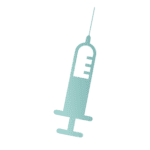DETAILS: The contraception injection provides a slow release of the hormone progestogen into your bloodstream to prevent pregnancy. Progesterone prevents the release of an egg from your ovary (ovulation) and also thickens the mucus in your cervix to stop the sperm from entering your uterus. You would need to have an injection every 2 or 3 months, depending on the type of injection you use. This is an effective form of contraception, with the highest risk of pregnancy being if you miss an injection. HOW TO: Ask your healthcare provider is the contraceptive injection is the right contraceptive method for you. Depending on the type of contraception injection your healthcare provider recommends, you will need to return to the clinic every 2 or 3 months for another injection. The injection is usually given in your bottom but can be given in your upper arm. There can be a delay of up to 1 year before your periods return to normal and you can become pregnant. CONS: You may experience: Details / How to
Pros / Cons
Frequently Asked Questions
PROS:
SIDE EFFECTS:
This website uses cookies to improve your web experience.
